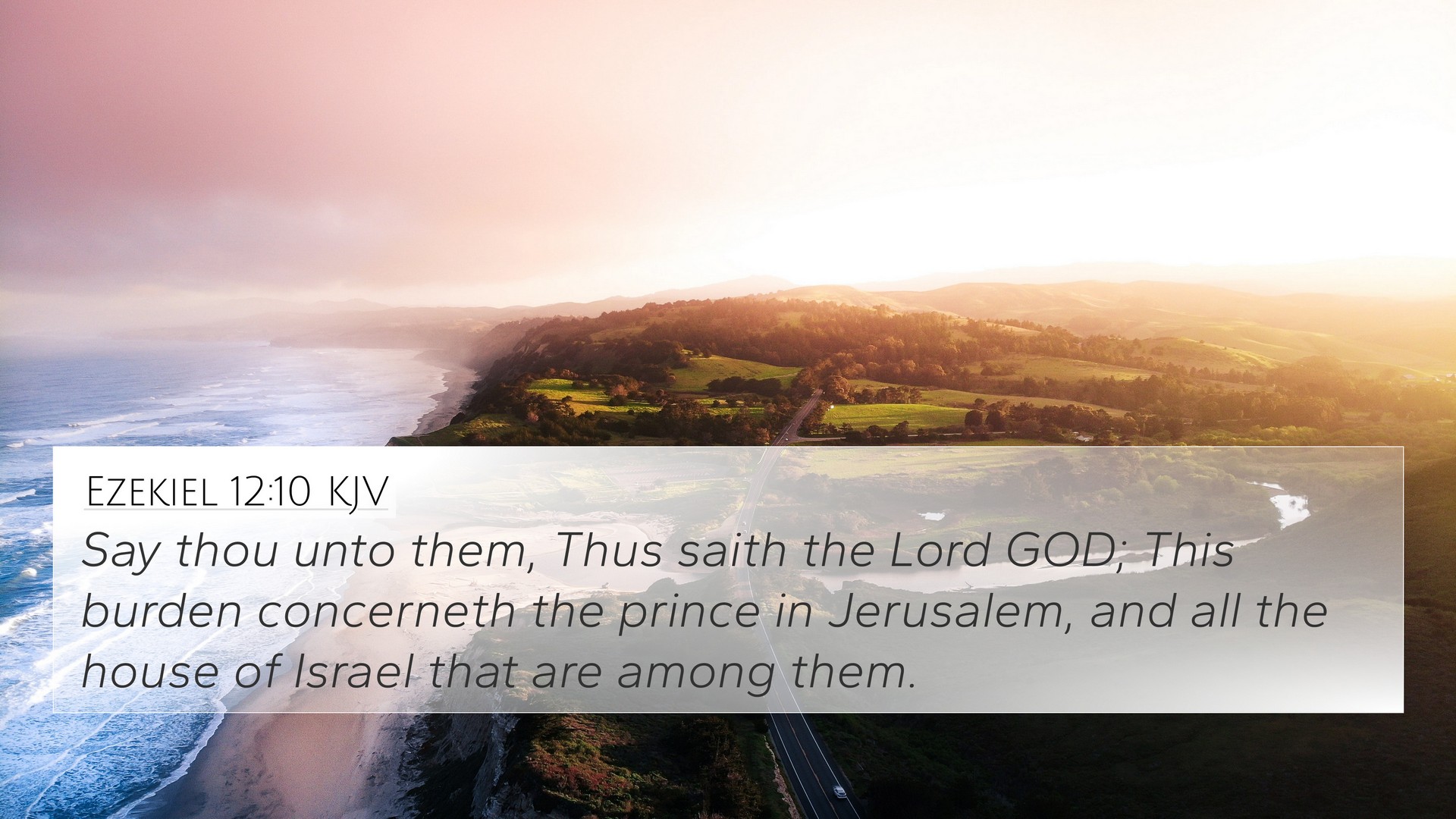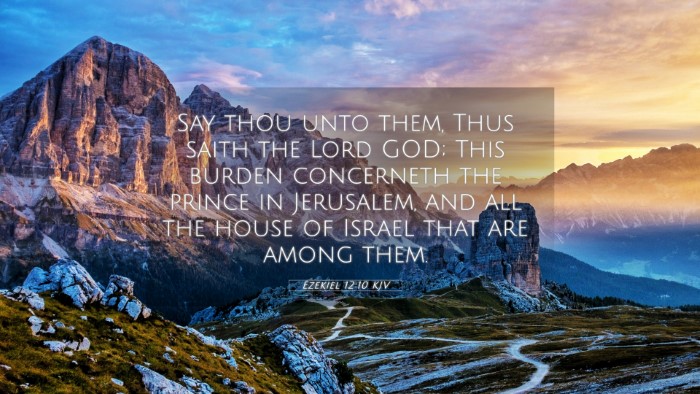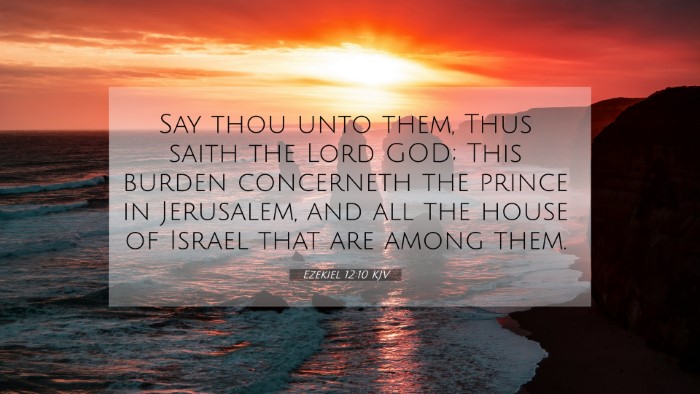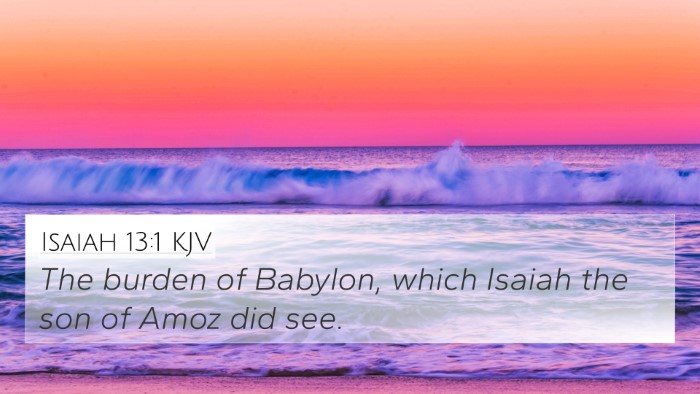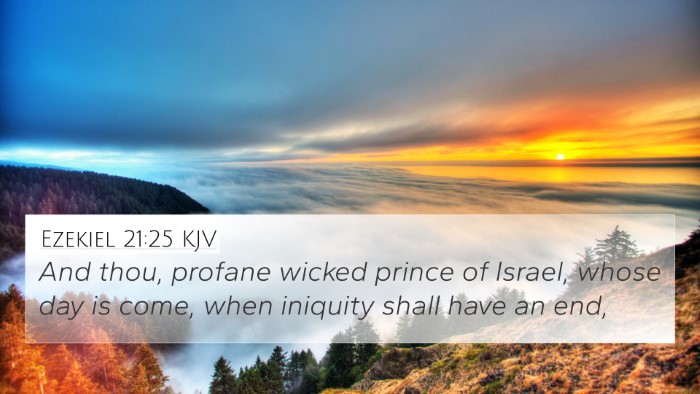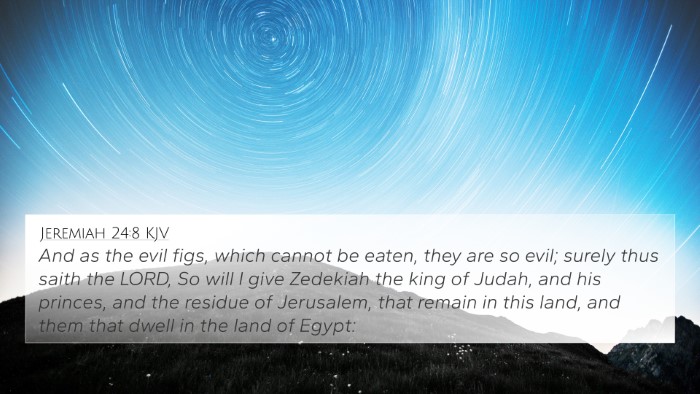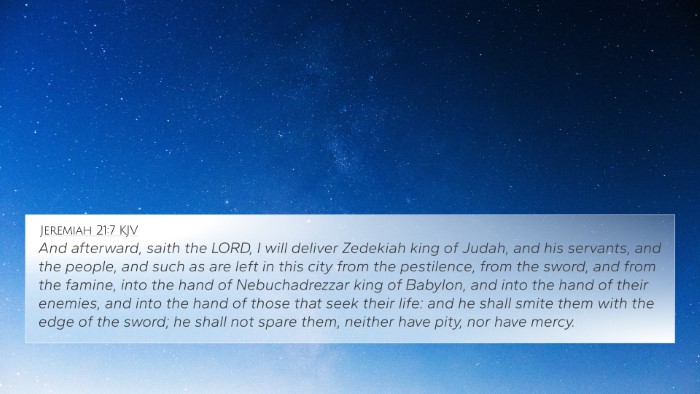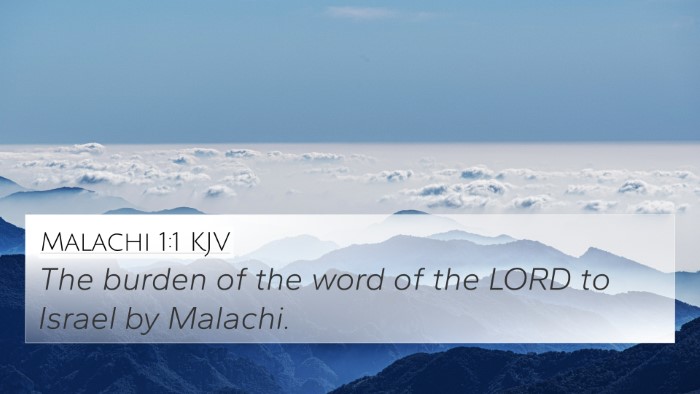Ezekiel 12:10 - Summary and Interpretation
Bible Verse: Ezekiel 12:10: "Say thou unto them, Thus saith the Lord God; This burden concerneth the prince in Jerusalem, and all the house of Israel that are among them."
This verse is part of the prophetic messages delivered by Ezekiel during the Babylonian exile of the Israelites. It highlights the burdens faced by the leadership in Jerusalem and the implications for the people of Israel. Below is a comprehensive exploration of its meaning using various public domain commentaries.
Understanding the Context
Ezekiel was a prophet who spoke to a people experiencing profound trauma due to their exile. The verses around Ezekiel 12:10 express God's judgment and the need for repentance. Here are insights combined from Matthew Henry, Albert Barnes, and Adam Clarke that enrich our understanding of this verse.
Matthew Henry's Commentary
- Henry emphasizes the theme of accountability, noting that the 'prince' signifies the leadership's role in the collective sins of the nation. The burden reflects the gravity of these sins and the inevitable consequences that the nation must face.
- He discusses how this message serves both as a warning and a call to reflection, urging leaders to bear the weight of their actions.
Albert Barnes' Notes
- Barnes expands on the 'burden' mentioned, describing it as a prophetic communication that conveys God's displeasure towards Jerusalem's leaders. This burden is not just for the leader ('prince') but extends to the entire house of Israel.
- He reinforces the notion that God is still in communication with His people, despite their transgressions, conveying a promise of hope for restoration if they heed the warnings.
Adam Clarke's Commentary
- Clarke explains that the term 'prince' can refer to various figures in Israel's political landscape, indicating that God's messages are directed to those in power.
- He notes the importance of understanding prophetic language, illustrating how this verse ties into broader themes of divine judgment and mercy across scripture.
Key Themes and Lessons
The passage encapsulates several profound themes within Ezekiel's ministry:
- Leadership Accountability: Leaders in any context are held to a higher standard, and this applies not just to political leaders but also spiritual ones.
- Divine Communication: Even in exile, God communicates with His people, offering guidance and correction.
- Consequences of Sin: The 'burden' of sin leads to national consequences, reminding readers of the weight of collective moral negligence.
Cross-References to Ezekiel 12:10
To enhance understanding, here are some key cross-references that relate to the themes of Ezekiel 12:10:
- Jeremiah 23:1-4: A warning against irresponsible shepherds of Israel.
- Ezekiel 3:17-19: The watchman metaphor, emphasizing the responsibility of leaders to warn the people.
- Isaiah 56:10-12: A critique of negligent leaders in Israel.
- 2 Kings 24:14-16: Discussion of the exile and the fate of the people of Jerusalem.
- Amos 3:7: God reveals His plans to His prophets, indicating ongoing communication.
- Hosea 4:6: God's people are destroyed for lack of knowledge, highlighting ignorance as a burden.
- Ezekiel 18:30: A call to repentance, central to the message of restoration.
Connections Between Bible Verses
The various interpretations and themes in Ezekiel 12:10 find echoes across the scriptures. Here are some points of connection that illustrate how biblical texts inform one another:
- Linking Leadership Accountability: Similar to Ezekiel 12:10, many biblical passages address the heavy burden of leadership, such as James 3:1, which warns that teachers will be judged more strictly.
- Collective Responsibility: The theme of collective sin, as seen in Romans 3:23, where all have sinned, parallels the message in Ezekiel.
- Restoration and Hope: Just as Ezekiel holds a message of impending judgment, 2 Chronicles 7:14 provides a path to healing through humility and prayer.
Conclusion
In summation, Ezekiel 12:10 serves as a crucial reminder of the roles that leaders play in the moral and spiritual direction of their communities. Through the insights gained from public domain commentaries and connections made through scriptural analysis, we see that this verse encourages both reflection and action in line with God's will. It sets the stage for understanding God's unwavering desire for His people to seek justice, righteousness, and restoration.
Further Study Tools
For those looking to deepen their understanding and explore connections further, here are some useful tools:
- Bible Concordance: A comprehensive tool for finding where specific words and themes appear in scripture.
- Bible Cross-Reference Guide: Guides to help identify relationships between verses.
- Cross-Referenced Themes in the Bible: Exploring thematic parallels across the text.
- Cross-Reference Bible Study Methods: Strategies for engaging texts in a comparative manner.
By utilizing such resources, individuals can gain a more nuanced understanding of how verses like Ezekiel 12:10 fit into the broader biblical narrative and theological discussions.
